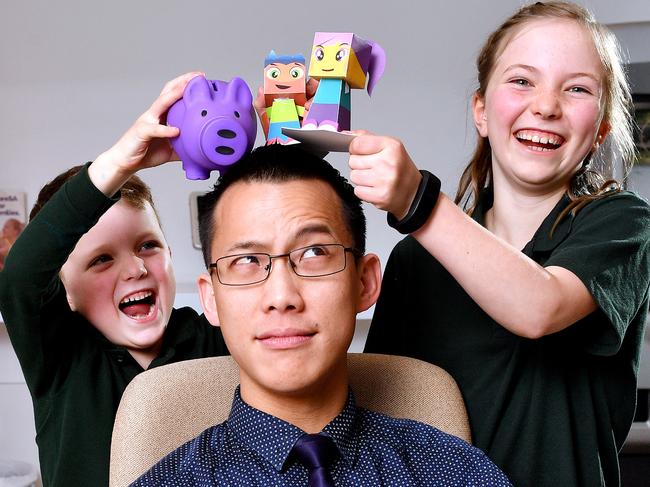Future-proof kids: Top teacher Eddie Woo tells how to help your child with maths
FEW things have the power to strike fear into the heart of a parent like the words of a child saying, “I need help with my maths homework.” Here, of the world’s top ten teacher’s Eddie Woo shares his tips.

Hills Shire
Don't miss out on the headlines from Hills Shire. Followed categories will be added to My News.
FEW things have the power to strike fear into the heart of a parent like the words of a child coming home and saying, “Mum, Dad … I need help with my maths homework.” Perhaps you felt as though you barely made it out of high school mathematics alive and were relieved to have that part of your life behind you, only to discover that you now need to try and engage with it all over again.
Or perhaps like me you were reasonably willing to give this another go, but were unexpectedly perplexed by the panoply of new techniques and strategies that the next generation is being taught for things like addition, subtraction and division.

Did we all miss the memo on when maths was rewritten? The good news is that there’s no need to panic — with patience and the right guidance, every parent can play a positive role in their child’s learning when it comes to mathematics. Here are three simple tips that you might find helpful.
HELP THEM DEVELOP MATHEMATICAL FLUENCY
Fluency is a word borrowed from linguistics. It’s our ability to automatically recall facts quickly and accurately, like the meaning of words and the grammar for constructing sentences, which then allows our minds to focus on using all those linguistic tools to actually communicate. In mathematics, the idea is very similar: mathematical fluency is our ability to remember formulas and perform arithmetic without deep concentration, which then becomes a stepping stone to more complex mathematical thinking. This is an important point to emphasise: mathematical fluency is almost always a means to an end, rather than an end in itself. For this reason, it’s often beneficial to support our children to do this in a way that shows there is clearly a goal or higher purpose for their mathematical skills.

If we simply ask our children to drill their times tables in the hope that it will sink into their long term memory, we convey the idea that multiplication facts are valuable in and of themselves — an idea that most children find preposterous. However, if we play a game with them like Monopoly — which includes arithmetic as a natural course of the game when you purchase properties and collect money from your friends — they sense that mathematical fluency serves a purpose in helping them to win.
FIND THE RIGHT PLACE TO BEGIN
That dreaded moment I mentioned before, when your child seems at a loss to understand their homework, may seem like the start of a nightmare. But if they come to you with a problem and say, “I just don’t get it,” then it’s almost certainly just the latest in a string of conceptual difficulties that your child has been experiencing for some time.
All knowledge in mathematics is interconnected, which is one of the most beautiful things about it as a subject: it’s like the expansive universe of a novel where the actions and goals of characters in very different places unite in a satisfying climax as the plot unfolds.
However, it also presents a challenge when learning the subject because all understanding is formed on the basis of prior knowledge — which means that just a single gap can cause a weak foundation and lead to problems later down the track.

In the previous point I mentioned the value of times tables as a key form of mathematical fluency. Times tables are the bedrock for students to become confident in dealing with fractions: the former is about multiplication and the latter is about division, making them natural partners. Children who struggle with times tables will often find fractions, decimals and percentages very difficult to comprehend. Fractions then go on to become the building blocks of trigonometry, and trigonometry is a central part of calculus which students learn in their senior years of high school. You can see how a child’s difficulties with mathematics may have been sown many years in the past, which makes it important to find the right place to begin when helping a child.
The most frequent question I pose to struggling students is, “Can you take me back to the place where you do understand?” That may be long in the past, but if I want a child to recover their mathematical confidence then I must go back far enough to build on a strong foundation.

BE WILLING TO EMBARK ON THE LEARNING JOURNEY YOURSELF
This is a basic principle of parenting more than it is of mathematics, but it applies here powerfully nonetheless. Our children are much better at learning what we do than what we say. When my first child was just a toddler, I would sometimes drive around the neighbourhood at night in the hopes that she would fall asleep. When I asked her to close her eyes, she sometimes responded by shutting her eyes and then smiling widely at me. “Why are you doing that with your mouth?” I would ask. “This is how I close my eyes,” she would respond. She had unconsciously connected smiling with closing her eyes because my own eyes become very narrow when I smile!
Mathematics is a practical skill, like mastering a musical instrument or playing a sport — so it requires practice. But children will quickly learn from us that it is not worth putting in the effort to learn this skill if we ourselves are unable to model the skill of learning with them. Relax, I’m not asking you to master differential calculus (though I wouldn’t stop you if you’d like to try!).
But if you can demonstrate a mindset of openness that is willing to put in some effort to learn, it makes a huge difference in the development of a child’s willingness to persevere with the subject.
● Eddie Woo is the head mathematics teacher at Cherrybrook Technology High School, Sydney. He has been teaching maths for more than 10 years. In 2018, Woo was named Australia’s Local Hero and short-listed as one of the top 10 teachers in the world.
